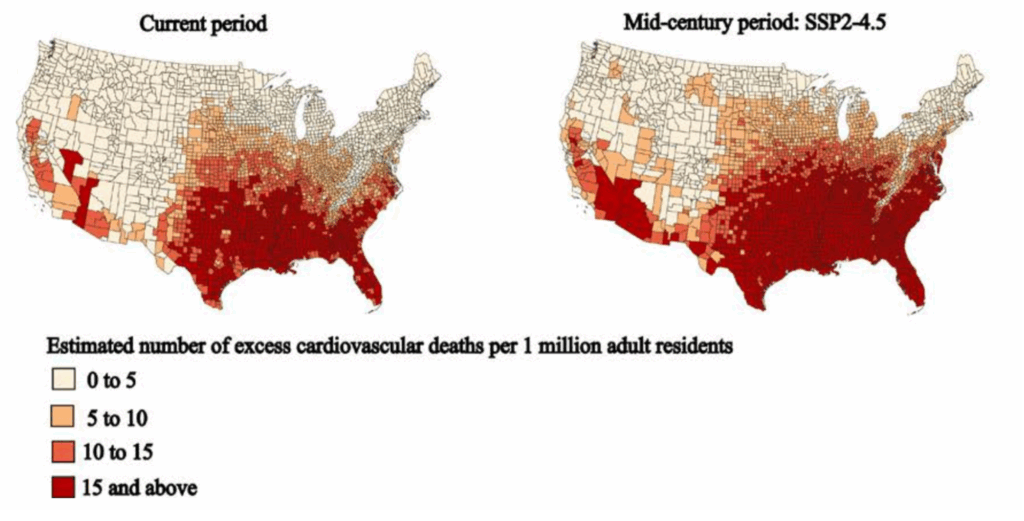Heatwaves and Heartaches: The Cardiovascular Toll of Climate Change
From 2008 to 2019, 1,651 cardiovascular deaths were attributed to extreme heat. As temperatures rise, these numbers are expected to climb.

Read Time: 2 minutes
Published:
Extreme heatwaves aren’t just swelteringly uncomfortable—they are also deadly. Heat is the leading cause of weather-related fatalities in the United States, causing more deaths annually than hurricanes and tornadoes combined in the past 30 years. In Massachusetts, summer temperatures have risen by 2.75°F in the past half-century, and will keep rising as climate change accelerates.
Extreme heat increases stress on the heart through dehydration, which elevates the risk of stroke, heart attack, and even heart failure. High temperatures pose the greatest threat to infants, older adults, and those with pre-existing cardiovascular conditions, who cannot tolerate the extra heart stress.
Residents of urban heat islands (i.e., areas much warmer than nearby suburbs or rural regions) also face increased risks. Heat-trapping infrastructure like tall buildings and asphalt retains heat longer, while limited vegetation reduces shade, resulting in citywide warming. Boston, a known heat island, can reach temperatures as high as 105°F, compared to 90°F in suburban Dedham. Black residents are particularly vulnerable due to historic housing discrimination and inadequate urban development, making them 52% more likely to live in heat islands than White residents.
A recent study by Sameed Ahmed M. Khatana and colleagues examined how extreme heat could impact heat-related cardiovascular deaths in the coming decades. The researchers analyzed adult mortality and county-level weather data between 2008 and 2019, focusing on days with a heat index of 90°F or higher, which combines humidity and temperature. They projected changes in the frequency of extreme heat days and cardiovascular deaths by midcentury (2036–2065).

Between 2008 and 2019, 1,651 cardiovascular deaths were attributed to extreme heat. As temperatures rise, heat-related cardiovascular fatalities are expected to climb by nearly 160%, surpassing 4,320 annual deaths by midcentury. If temperatures exceed 100°F, annual deaths could surpass 5,771 by midcentury.
The impact will be severe for adults over 65, whose heat-related mortality is projected to increase by 187%, compared to 53% among older adults. The disparity is even more striking across race: deaths are projected to rise by 365% for Black adults versus 80% for White adults.
The results highlight the urgent need for public infrastructure changes to reduce climate-related health risks. Strategies include installing reflective pavement in heat islands, implementing heat action plans, or expanding tree canopy covers. In 2023, Massachusetts developed the ResilientMass Plan: a new heat advisory system and statewide cooling initiatives to lessen heat-related impacts.
In a warming world, preparing for the extreme heat now is a necessary step to protect community health for generations to come.



